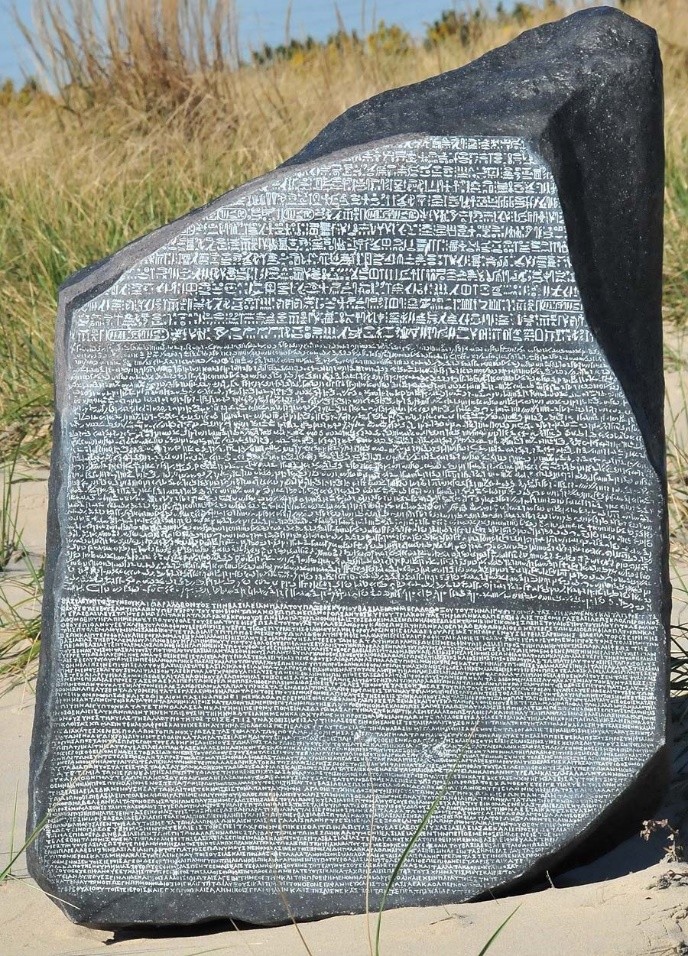
To listen to today’s reflection as a podcast, click here
When French general Napoleon Bonaparte invaded Egypt in 1798, he brought along with his troops a crack team of 167 scientists and scholars.
Napoleon was determined to plunder Egypt of its artistic treasures. Quite by accident, his team helped solve one of the enduring mysteries of the ancient world.
A French soldier came upon a large black granite-like stone. Its surface had been chiseled with words in three different languages. The stone had been lugged over to a construction site near the town of Rosetta, where it was about to become part of the wall of a French fort.
The French scholars immediately recognized the potential significance of this discovery. It turned out that the engraving, which dated to about 200 years before Christ, didn’t yield any astonishing new historical insights. The carved news flash was that Egyptian King Ptolemy V was divine. Ho-hum.
But the language at the top of the stone was ancient Egyptian hieroglyphics. And no living person on earth, inside or outside Egypt, knew how to read hieroglyphics.
The bottom language was Greek. Thousands of scholars could read Greek in their sleep. The middle language was Demotic, an ancient tongue favored by the common people (Demotic is from the same root as “democracy”).
If the three parts of the stone were all reporting the same message, would it be possible for linguistic scholars to crack the code of the hieroglyphics by comparing it with the Greek and Demotic?
That’s exactly what happened.
It wasn’t easy. Greek reads from left to right, like English. Demotic reads from right to left, like Arabic and Hebrew. It turns out that hieroglyphics could be written in any direction at all, including up and down like Asian scripts. The French scholar Jean-Francois Champollion announced in 1822 that he had at last cracked the code.
Archaeologists could now go to Egyptian sites and literally read the writing on the wall.
Two years after the Rosetta Stone’s discovery, the British defeated Napoleon in Egypt. They promptly grabbed the priceless black rock. That’s why it sits in London today, where it is hands down the number one attraction at the British Museum. The French want it back. The Egyptian government, meanwhile, has made it quite clear that the stone belongs in Cairo.
Historians would agree that the Rosetta Stone is a gift that belongs to the whole world. It represents the Big Breakthrough – the essential key to seeing with new eyes something that used to be shrouded in fog.
When it came to figuring out who would be God’s Chosen One, the Messiah, the people of Judea were completely fogged in.
That’s because there were a variety of ways to read the Law and the Prophets (what Christians today call the Old Testament). Was the Messiah supposed to be human or divine? Would he bring war or peace? Would he save the whole world or just Israel?
Over the years, plenty of messianic candidates emerged. We know of at least 18 wannabes who lived during Jesus’ lifetime alone. One was a fellow named Theudas. Brimming with confidence, he announced he could part the Jordan River and bring down the walls of Jerusalem with a single word. Instead, the Romans captured him and put him to death.
When Jesus was a boy, Judas the Galilean rallied would-be revolutionaries to his side. Once again, Rome won. Judas and 2,000 of his companions were crucified simultaneously along Galilean roadsides. The crosses were left standing for months as a kind of public service announcement: Don’t end up on the wrong side of Rome, or this will happen to you, too.
There was a predictable sameness to being a failed Messiah: You always ended up dead. If you saw your favorite candidate for Messiah hanging on a cross, it meant you had backed the wrong horse.
That’s why the people in Jerusalem who were hoping against hope that Jesus would turn out to be the real Messiah were so stunned by something he said.
“I, when I am lifted up from the earth, will draw all people to myself” (John 12:32).
Jesus was predicting his own death. He was announcing, flat out, that he was going to be crucified, just like all the other failed Messiahs.
The crowd responded, “Wait a minute. You’re calling yourself the Son of Man [that’s how God’s Chosen One was identified by the prophet Daniel], yet you’re saying you’re going to be lifted up on a cross. How can that be?” Who is this Son of Man?
He is God’s Rosetta Stone.
Jesus the Messiah will make sense of all the competing storylines. He will clear away the fog and crack the code, the one that no one had ever been able to figure out. Only when Jesus’ followers looked back on his life — and especially his final Weekend — would they grasp that he was fulfilling all the messianic expectations in a way no one could have guessed.
Jesus is still the Rosetta Stone for you and me.
Let’s face it: Life is frequently a mess. You’ve done everything possible to make things right in your family, yet parents or siblings or children still seem to resent you. How can that be fair? God says he’s in charge of the universe, yet human suffering goes on and on. Why does he let it happen? You’ve been diligently praying for guidance. Why, then, is God so maddeningly silent?
At the Last Supper, when Jesus’ disciples were burdened by the same kinds of questions, he said, “Don’t let your hearts be troubled. You trust in God. Trust in me, too” (John 14:1).
He is God’s Rosetta Stone.
And if we’re willing to hang on to him, he will eventually clear away the fog and make sense of things in a way we never could have guessed.
